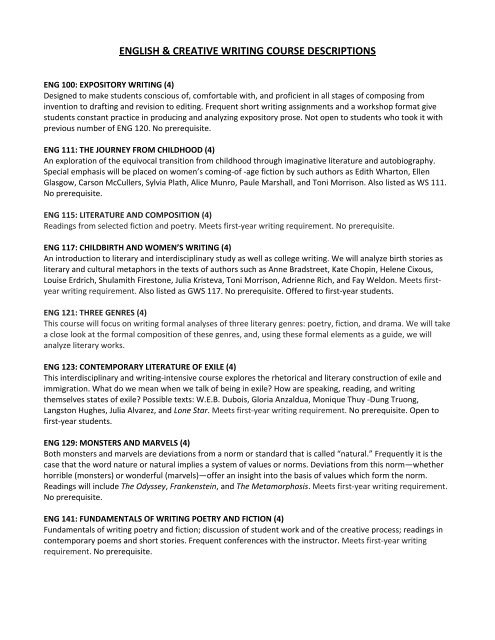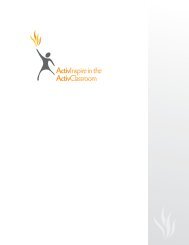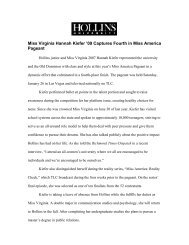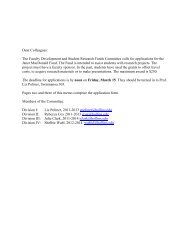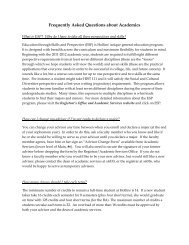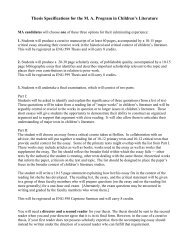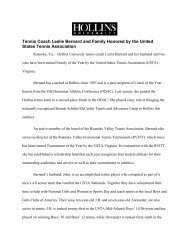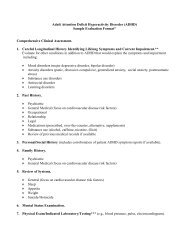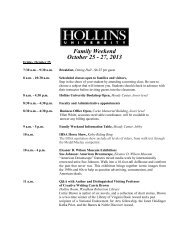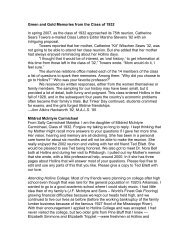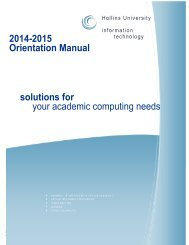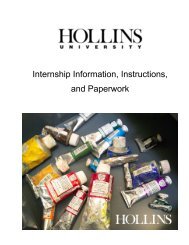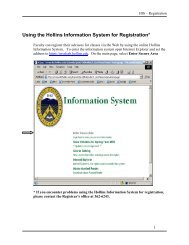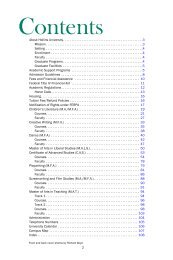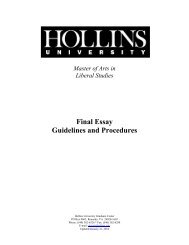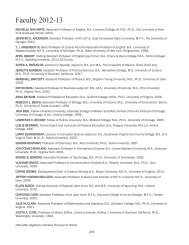ENGLISH & CREATIVE WRITING COURSE DESCRIPTIONS
ENGLISH & CREATIVE WRITING COURSE DESCRIPTIONS
ENGLISH & CREATIVE WRITING COURSE DESCRIPTIONS
You also want an ePaper? Increase the reach of your titles
YUMPU automatically turns print PDFs into web optimized ePapers that Google loves.
<strong>ENGLISH</strong> & <strong>CREATIVE</strong> <strong>WRITING</strong> <strong>COURSE</strong> <strong>DESCRIPTIONS</strong><br />
ENG 100: EXPOSITORY <strong>WRITING</strong> (4)<br />
Designed to make students conscious of, comfortable with, and proficient in all stages of composing from<br />
invention to drafting and revision to editing. Frequent short writing assignments and a workshop format give<br />
students constant practice in producing and analyzing expository prose. Not open to students who took it with<br />
previous number of ENG 120. No prerequisite.<br />
ENG 111: THE JOURNEY FROM CHILDHOOD (4)<br />
An exploration of the equivocal transition from childhood through imaginative literature and autobiography.<br />
Special emphasis will be placed on women’s coming‐of ‐age fiction by such authors as Edith Wharton, Ellen<br />
Glasgow, Carson McCullers, Sylvia Plath, Alice Munro, Paule Marshall, and Toni Morrison. Also listed as WS 111.<br />
No prerequisite.<br />
ENG 115: LITERATURE AND COMPOSITION (4)<br />
Readings from selected fiction and poetry. Meets first‐year writing requirement. No prerequisite.<br />
ENG 117: CHILDBIRTH AND WOMEN’S <strong>WRITING</strong> (4)<br />
An introduction to literary and interdisciplinary study as well as college writing. We will analyze birth stories as<br />
literary and cultural metaphors in the texts of authors such as Anne Bradstreet, Kate Chopin, Helene Cixous,<br />
Louise Erdrich, Shulamith Firestone, Julia Kristeva, Toni Morrison, Adrienne Rich, and Fay Weldon. Meets firstyear<br />
writing requirement. Also listed as GWS 117. No prerequisite. Offered to first‐year students.<br />
ENG 121: THREE GENRES (4)<br />
This course will focus on writing formal analyses of three literary genres: poetry, fiction, and drama. We will take<br />
a close look at the formal composition of these genres, and, using these formal elements as a guide, we will<br />
analyze literary works.<br />
ENG 123: CONTEMPORARY LITERATURE OF EXILE (4)<br />
This interdisciplinary and writing‐intensive course explores the rhetorical and literary construction of exile and<br />
immigration. What do we mean when we talk of being in exile? How are speaking, reading, and writing<br />
themselves states of exile? Possible texts: W.E.B. Dubois, Gloria Anzaldua, Monique Thuy ‐Dung Truong,<br />
Langston Hughes, Julia Alvarez, and Lone Star. Meets first‐year writing requirement. No prerequisite. Open to<br />
first‐year students.<br />
ENG 129: MONSTERS AND MARVELS (4)<br />
Both monsters and marvels are deviations from a norm or standard that is called “natural.” Frequently it is the<br />
case that the word nature or natural implies a system of values or norms. Deviations from this norm—whether<br />
horrible (monsters) or wonderful (marvels)—offer an insight into the basis of values which form the norm.<br />
Readings will include The Odyssey, Frankenstein, and The Metamorphosis. Meets first‐year writing requirement.<br />
No prerequisite.<br />
ENG 141: FUNDAMENTALS OF <strong>WRITING</strong> POETRY AND FICTION (4)<br />
Fundamentals of writing poetry and fiction; discussion of student work and of the creative process; readings in<br />
contemporary poems and short stories. Frequent conferences with the instructor. Meets first‐year writing<br />
requirement. No prerequisite.
ENG 142: INTERMEDIATE <strong>CREATIVE</strong> <strong>WRITING</strong> (4)<br />
The writing of poetry and fiction; intermediate level. Includes discussion of student work and contemporary<br />
short stories and poems. Frequent conferences with the instructor. Meets first‐year writing requirement.<br />
Prerequisite: ENG 141.<br />
ENG 150: SPECIAL TOPIC – AMERICAN DREAMS/AMERICAN NIGHTMARES (4)<br />
“Oh brave new world!” or Nightmare on Elm Street? This course explores aspects of the American Dream and its<br />
opposite, the American nightmare, in literature and film. Works discussed include F. Scott Fitzgerald’s Tender is<br />
the Night, Richard Wright’s Native Son, Norman Mailer’s Why are we in Vietnam, Ken Kesey’s One Flew Over the<br />
Cuckoo’s Nest, and Toni Morrison’s Beloved. And films such as John Ford’s The Grapes of Wrath, based on John<br />
Steinbeck’s novel, Orson Wells’ Citizen Kane, The Deer Hunter, directed by Michael Cimino and starring Robert<br />
De Niro, and Sam Mendes’ American Beauty. No prerequisite.<br />
ENG 150: SPECIAL TOPIC ‐ CRIME FICTION (4)<br />
We will read a number of classical and modern works having to do with crime and law enforcement, and<br />
consider how such works reflect their various cultural, political, and literary contexts. Texts may include such<br />
diverse authors as Sir Conan Doyle, Patricia Highsmith, Edgar Allen Poe, and Walter Mosely. In addition to<br />
literature, we will consider folk and contemporary popular music, film, comic books, and television, and reflect<br />
on the social relevance as well as the enduring popularity (both in "high" and "pop" culture) of the crime genre.<br />
ENG 150: SPECIAL TOPIC ‐ ENTERING NATURE (4)<br />
An exploration of poetry, fiction, and essays that address the perceived borderlands between humans and<br />
nature, mind and body, self and world. Concepts of the wild, borders, place, and wonder will remain in focus as<br />
we consider descriptions of nature as well as how characters experience instants of revelation and/or the<br />
gradual enrichment of the human‐centered soil by the cosmological mulch. Authors include Whitman, Rilke,<br />
Silko, Hogan, Erdrich, Fowles, and others. No prerequisite.<br />
ENG 150: SPECIAL TOPIC – FOLK AND FAIRY TALES (4)<br />
Fairy Tales provide a rich treasure‐trove for critical and creative exploration. In this course, we will examine<br />
stories with their roots in oral tradition, as well as the literary tales inspired by and entwined with them. We will<br />
also examine different critical approaches to analyzing these tales, the interplay of oral and literary traditions,<br />
and modern creative work in a variety of genres.<br />
ENG 150: SPECIAL TOPIC ‐ THE HARLEM RENAISSANCE (4)<br />
The Harlem Renaissance from 1919–1934 was a major period in American intellectual and artistic life. African‐<br />
Americans began to create art in ways that expressed a new‐found sense of self‐awareness. The period<br />
represented a fertile outpouring of creative work. By exploring the Harlem Renaissance, students will examine<br />
how writers and artists articulated issues of nationalism, gender, racism, and economic disparity. No<br />
prerequisite.<br />
ENG 150: SPECIAL TOPIC – INTERNATIONAL WOMEN’S VOICES (4)<br />
This course explores the diversity of women’s voices and experiences through contemporary literature and film.<br />
Discussions will focus on how women respond to the forces of culture, language, politics, gender, and national<br />
identity. Readings and films will include a variety of work from Africa, Asia, the Middle East, and Latin America.<br />
ENG 150: SPECIAL TOPIC – THE IRISH RENAISSANCE (4)<br />
The Irish Renaissance, which revived ancient Irish folklore, legends, and traditions in literary works, emerged<br />
during the late 19th‐ and early 20thcenturies. This literary and political movement produced some of the most<br />
important literature of the modern era, including the poetry and plays of Yeats, the dramas of J. M. Synge and<br />
Sean O'Casey, and the novels of James Joyce. Also listed as HUM 150. No prerequisite.
ENG 150: SPECIAL TOPIC ‐ LIFE TO FILM: HOLLYWOOD AND THE REPRODUCTION OF HISTORY (4)<br />
An explanation of how biopics (fictional films about actual persons) affect our perception of history and the<br />
individuals who help form it, with a special focus on the significance of narrative content, audience, and<br />
persuasion. Subjects include Joan of Arc, Malcolm X, Frida Kahlo, and Queen Elizabeth. No prerequisite.<br />
ENG 150: SPECIAL TOPIC – NOVELS WE ALL SHOULD HAVE READ (4)<br />
In this course we will read and discuss a selection of memorable novels, as well as some critical commentary—<br />
by major writers of the 19th and 20 th centuries. The main emphasis will be on a careful, conscientious reading of<br />
the texts with the aim of enhancing aesthetic appreciation and understanding the moral issues with which the<br />
novels engage. To achieve this we will pay careful attention to the development of a critical vocabulary—a<br />
lexicon of critical and theoretical terms—with which to address issues raised by the works in question. In<br />
addition, we will give some attention to the historical context in which the texts were written in order to gain an<br />
understanding of the connections between the age and the literary productions thereof. No prerequisite. Open<br />
to first‐year students.<br />
ENG 150: SPECIAL TOPIC – READINGS FROM APPALACHIA (4)<br />
An introduction to the rich literary tradition of the Appalachian region. This interdisciplinary and writingintensive<br />
course will explore poetry and prose, examining the challenges faced by the region and cutting<br />
through negative stereotypes. Readings may include works by James Still, Frank X Walker, Kathryn Stripling Byer,<br />
and Hollins alumni Lee Smith and David Huddle.<br />
ENG 150: SPECIAL TOPIC – A SENSE OF PLACE IN LITERATURE (4)<br />
This course examines literature with a strong geographical sense of place—well‐grounded writing, so to speak.<br />
Texts will include the novels Winesburg, Ohio and The Country of the Pointed Firs, and the memoir The Solace of<br />
Open Spaces, among others. Development of critical writing skills will be of concern. No prerequisite.<br />
ENG 150: SPECIAL TOPIC – THE SURREALIST REVOLUTION (4)<br />
From the hilarious to the profound, this course will explore some of the most intriguing and challenging<br />
literature of the twentieth century: works that broaden and challenge what we think of as “real.” The course<br />
examines the origins of the surrealist movement in Europe, and its subsequent expansion in the Caribbean and<br />
the United States. It attempts to understand the use of structures and themes, in their multiple manifestations:<br />
literature, painting, theater, film, music, and autobiography. Participants will examine the work of André Breton,<br />
Aimé Césaire, Claude Cahun, Meret Oppenheim, Antonin Artaud, Salvador Dali, and several others. Students will<br />
also practice classic surrealist experimental techniques like automatic writing, photomontage, and “The<br />
Exquisite Corpse.” No prerequisite.<br />
ENG 151: CLOSE READING, CRITICAL <strong>WRITING</strong> (4)<br />
An introduction to literary studies at the college level. This is a course about how important stories and ideas are<br />
reanimated across genre, time, and cultures. Along the way you will experience your own transformation as a<br />
reader, thinker, and writer. This course meets the 100‐level literature course requirement for potential majors,<br />
but all are welcome. No prerequisite.<br />
ENG 152: THE CHILD’S IMAGINATION: CHILDREN IN LITERATURE (4)<br />
An exploration of the role(s) of the child in literature with a special focus on the significance of the imagination.<br />
Texts include Jane Eyre, Anne of Green Gables, The Little Prince, and My Name is Asher Lev. Assignments include<br />
weekly papers and oral presentations. No prerequisite.
ENG 160: EXTREME FICTIONS (4)<br />
American culture loves to take life to the extreme. From “extreme sports” and “extreme foods” to “extreme<br />
surgery” and even “extreme dating,” we are a culture that consistently rejects the center and gravitates toward<br />
the poles. In this interdisciplinary and writing‐intensive course, we examine works of prose, poetry, film, music,<br />
and television that are “extreme” in some way: extremely short or extremely long, extremely popular or<br />
extremely obscure, extremely political or extremely aesthetic, extremely serious or extremely nonsensical. In<br />
addition to discussing the impact that such various forms of excess have on narrative content and artistic merit,<br />
we consider why the trope of the extreme has remained so powerful and pervasive in the nation’s literature and<br />
culture.<br />
ENG 165: EXPLORING THE HARLEM RENAISSANCE (4)<br />
The Harlem Renaissance was a major period in American intellectual and artistic life. African Americans began to<br />
create literature that expressed a new found sense of self‐determination and self‐awareness. The period<br />
represented a fertile out‐pouring of creative work that articulated a new vision for the 20th century. It brought<br />
together the voices of writers like Langston Hughes, Jean Toomer, and Zora Neale Hurston, along with painters<br />
like Aaron Douglass, sculptors like Sargent Johnson, and musicians like Duke Ellington and Louis Armstrong. The<br />
primary goal of this course is to introduce students to various rhetorical and stylistic methods that these writers<br />
and artists used to examine issues of nationalism, gender, racism, and economic disparity. No prerequisite.<br />
ENG 168: NOVELS WE ALL SHOULD HAVE READ (4)<br />
This course focuses on a selection of memorable novels by major writers of the 19th and 20th centuries.<br />
Emphasis will be placed on a conscientious reading of texts with the aim of enhancing aesthetic appreciation<br />
and understanding the moral issues that the novels convey. Attention will be paid to the development of a<br />
critical vocabulary and an understanding of the historical contexts in which the texts were written. No<br />
prerequisite.<br />
ENG 197F: FIRST‐YEAR SEMINAR – AMERICAN DREAMS/AMERICAN NIGHTMARES (4)<br />
“Oh brave new world!” or Nightmare on Elm Street? The discovery of America set in motion the development of<br />
a myth, an ideal that persists today, the American Dream. The phrase, first used by James Truslow Adams in his<br />
book The Epic of America in 1931, existed even before the discovery of the North American continent and has<br />
evolved and morphed over time. However, there proved to be an underside to the American Dream. The Great<br />
Depression, with its images of migrant and destitute workers, was one aspect. The Vietnam War proved to be<br />
another. This first‐year seminar explores the development of the American Dream and its opposite, the<br />
American Nightmare, through literature and film. We will begin by reading texts related to the discovery of<br />
American and European expectations for the “new world.” Then we will explore various modern literary works,<br />
including several important American novels: F. Scott Fitzgerald’s The Beautiful and the Damned, Richard<br />
Wright’s Native Son, Norman Mailer’s Armies of the Night, and Toni Morrison’s Beloved. Concurrently with the<br />
discussions of these novels, we will critically evaluate such films as John Ford’s The Grapes of Wrath, based on<br />
John Steinbeck’s novel, Orson Wells’ Citizen Kane, The Deer Hunter, directed by Michael Cimino and starring<br />
Robert De Niro, and Sam Mendes’ American Beauty. Placement to be determined during the summer.<br />
ENG 197F: FIRST‐YEAR SEMINAR ‐ <strong>CREATIVE</strong> CODE: THE ART AND SCIENCE OF INTERACTIVE MEDIA (4)<br />
The field of interactive media, examples of which include computer‐based art and hypertext poetry, is redefining<br />
both art and science. In this seminar, we will work at the intersection of several emerging fields: computer<br />
animation, interactivity, and hypertext literature. Placement to be determined during the summer.<br />
ENG 197F: FIRST‐YEAR SEMINAR – EDIBLE POETRY (4)<br />
Close reading and discussion of poems that deal with food, its gathering, preparation, sharing, and eating.<br />
Poems by Roethke, Hongo, Espada, Neruda, Rich, Gluck, Li‐Young Lee, Tracy K. Smith, Wendell Berry, Langston<br />
Hughes, Frank O’Hara, and those of many other authors will be explored. As we encounter these works in
eading, class, in our essays, and through experiential means, we will focus on form (page as plate), subject,<br />
tradition, meaning, and making. Placement to be determined during the summer.<br />
ENG 197F: FIRST‐YEAR SEMINAR ‐ THE NATURE AND CULTURE OF WATER (4)<br />
An exploration of the ways water runs through American nature writing. By close reading, writing, and<br />
fieldwork, we will examine and experience how authors integrate this “element” into their work, as well as the<br />
way water functions as myth, metaphor, ritual, resource, image, and form. The natural and cultural realities of<br />
our local and home watersheds will remain in focus as we consider how characters and authors reckon with the<br />
presence of water in their worlds. Placement to be determined during the summer. Also listed as ES 197F.<br />
ENG 197F: FIRST‐YEAR SEMINAR – WOMEN/ BODIES/ VOICES (4)<br />
This class works from the premise that “knowledge is power” to the conclusion that self‐knowledge leads to<br />
personal and community empowerment. Reading from a feminist perspective, we’ll think about how literature<br />
helps us better understand ourselves and our communities. Course texts include fairy tales, stories, essays, and<br />
novels by authors such as Margaret Atwood, Eve Ensler, Charlotte Perkins Gilman, Barbara Kingsolver, Robin<br />
McKinley, and Peggy Vincent. Also listed as GWS 197F. Placement to be determined during the summer<br />
ENG 197F: FIRST‐YEAR SEMINAR – WOMEN, HEALTH, AND CULTURE (4)<br />
Is it safe to go to the doctor? Is it important to play as hard as you work? In this seminar we investigate women’s<br />
health and leadership from multiple perspectives to explore what health means to us as individuals and as a<br />
culture. Together we will read and interpret a variety of texts (poetry, fiction, nonfiction, popular culture, and<br />
educational films), participate in workshops (yoga, self‐defense, climbing wall, and field trips), and develop<br />
personal plans for health and wellness. Placement to be determined during the summer. Also listed as GWS<br />
197F.<br />
ENG 197F: FIRST‐YEAR SEMINAR ‐ WOMEN, HEALTH, AND POWER (4)<br />
This course works from the premise that “knowledge is power” to the conclusion that self‐knowledge leads to<br />
personal and community empowerment. Reading from feminist perspectives, we will investigate issues such as<br />
fertility, mental health, body image, and sexualities. Placement to be determined during the summer. Also listed<br />
as GWS 197F.<br />
ENG 207, 208: ADVANCED <strong>CREATIVE</strong> <strong>WRITING</strong> (2, 2)<br />
A seminar in creative writing. May be repeated for credit. Seniors, with permission, may elect this course for<br />
four credits (ENG 407, ENG 408) each term during the senior year. Prerequisites: ENG 141, ENG 142, or<br />
permission.<br />
ENG 210: <strong>CREATIVE</strong> NONFICTION (4)<br />
This course focuses on the writing of creative nonfiction, including personal essays, memoir, and travel writing.<br />
Students will develop their writing through the process of sharing their work with others, reading a variety of<br />
authors, experimenting with new ways of writing, responding to each other’s work, and focusing on revision.<br />
The course is open to beginning as well as advanced nonfiction writers. Prerequisite: sophomore standing or<br />
permission.<br />
ENG 211: MULTICULTURAL WOMEN WRITERS (4)<br />
This course focuses on the work of several 20th‐century women writers whose work explores issues of culture,<br />
ethnicity, and American identity. Our discussions will address the following issues: how each character struggles<br />
to create a sense of female identity within the often conflicting influences of family and American culture; how<br />
authors respond to stereotypes of their cultural heritage; and how they depict the history of their group within<br />
the larger context of American history. Readings include a variety of authors from different backgrounds. We’ll
also watch several feature‐length movies. Meets first‐year writing requirement. Also listed as GWS 211. No<br />
prerequisite. Open to first‐year students.<br />
ENG 221: AFRICAN‐AMERICAN LITERATURE (4)<br />
This survey course will focus on African‐American literature from the 1920s to the present. Topics include the<br />
Harlem Renaissance, the Black Arts Movement, and black women writers. We will examine the various ways the<br />
black experience has been depicted in poetry, fiction, and drama, as we discuss issues of aesthetics, community,<br />
and gender. Prerequisite: one semester of college work or permission.<br />
ENG 223: MAJOR BRITISH WRITERS I (4)<br />
An introduction to the dominant metaphors, structures, and themes of English Medieval and Renaissance<br />
literature as they are embodied in selected works of Chaucer, Shakespeare, Milton, and Pope. Prerequisite: one<br />
semester of college work or permission.<br />
ENG 224: MAJOR BRITISH WRITERS II (4)<br />
An introduction to British poetry, fiction, and prose nonfiction of the Romantic, Victorian, and Modern periods.<br />
Prerequisite: one semester of college work or permission.<br />
ENG 225: MODERN SOUTHERN WRITERS (4)<br />
An examination of several important writers, including such authors as William Faulkner, Flannery O’Connor,<br />
Robert Penn Warren, Tennessee Williams, Reynolds Price, and Eudora Welty. Prerequisite: one semester of<br />
college work or permission.<br />
ENG 227: THE EARLY MODERN CYBORG (4)<br />
After establishing a contemporary vocabulary for “cyborgs” and “cybernetics,” we will trace the early ancestors<br />
of the contemporary “cyborg,” an integrated human‐machine system, in examples of poetry and science of the<br />
17th‐ and early 18th‐century. Prerequisite: one semester of college work or permission.<br />
ENG 230: THE TEXTUAL CONSTRUCTION OF GENDER (4)<br />
Beginning with the premise that sex (biological difference) differs from gender (the significance attributed to<br />
sexual difference), this course historically and thematically surveys various models of gender construction.<br />
Readings are drawn from the classics, the Bible, Freud, and contemporary writers. Also listed as GWS 230. Open<br />
to first‐year students. No prerequisite.<br />
ENG 242: CHILDREN’S LITERATURE (4)<br />
ENG 242: INTRODUCTION TO CHILDREN’S LITERATURE (4)<br />
An introduction to traditional and contemporary classics. This course provides a foundation both in the history<br />
and interpretation of children’s literature and in the practical implications of book selection and censorship. Also<br />
listed as GWS 243. Prerequisite: one semester of college work or permission.<br />
ENG 248: BUDDHIST LITERATURE: EAST AND WEST (4)<br />
Novels, poems, films, and literary nonfiction (U.S., China, Japan, Germany, England, Korea, Tibet) written in light<br />
of Mahayana Buddhist teachings. Close readings in the contexts of diverse cultural re‐inscriptions of a global<br />
system of practice and understandings. Topics include art as delusion, emptiness, paradise, the road to<br />
awakening, and blue mountains walking. No background in Buddhism required. Prerequisite: sophomore<br />
standing or permission of instructor.<br />
ENG 250: SPECIAL TOPIC ‐ THE ARTIST’S JOURNAL (4)<br />
In this course, we will consider the artist's journal as a subgenre of literature in its own right and for its<br />
usefulness to writers, artists, and thinkers of all kinds. We will examine how, despite the journal's fragmentary
nature, it can become a place where chance observations, ideas, and a heightened contemplation of the<br />
interactions between the internal and external world give rise to the organic wholeness of a creative personality.<br />
In addition to the published journals of artists and writers, we will analyze a variety of works that feature<br />
organizational strategies typical of journals, including examples of contemporary fiction, poetry, creative<br />
nonfiction, and visual arts which employ devices of fragmentation, ellipsis, and collage. Figures we may study<br />
include Franz Kafka, Frida Kahlo, Alice James, Virginia Woolf, Ralph Waldo Emerson, Paul Gauguin, Gerard<br />
Manley Hopkins, Eugene Delacroix, Sylvia Plath, Theodore Roethke, Edward Lear, Charles Wright, F. Scott<br />
Fitzgerald, and Ernest Hemingway. We will not neglect such current high‐tech manifestations of the journal as<br />
You Tube and blogs. In addition to analytical writing, students will produce journals of their own. Appropriate for<br />
literary scholars, creative writers, visual artists, and anyone else with an interest in modern and contemporary<br />
literature and the arts.<br />
ENG 250: SPECIAL TOPIC ‐ CONTEMPORARY BRITISH WOMEN NOVELISTS (4)<br />
Studies in selected 20th‐century novelists, featuring work by Muriel Spark, Anna Kavan, Barbara Pym, Angela<br />
Carter, Anita Brookner, Barbara Comyns, Jeanette Winterson, and others. Prerequisite: One semester of college<br />
work or permission.<br />
ENG 250: SPECIAL TOPIC ‐ <strong>CREATIVE</strong> NONFICTION (4)<br />
This course focuses on the writing of creative nonfiction, including personal essays, memoir, and travel writing.<br />
Students will develop their writing through the process of sharing their work with others, reading a variety of<br />
authors, experimenting with new ways of writing, responding to each other’s work, and focusing on revision.<br />
The course is open to beginning as well as advanced nonfiction writers. Prerequisite: sophomore standing or<br />
permission.<br />
ENG 250: SPECIAL TOPIC ‐ FOOL FOR LOVE (4)<br />
This course focuses on the idea of romantic love in modern comedic fiction. We explore what makes a work<br />
“funny.” Course discussion will also examine comedy as it relates to community, aesthetics, values, and gender.<br />
Readings may include Lucky Jim, Bridget Jones’s Diary, The Bushwacked Piano, as well as five to seven additional<br />
books.<br />
ENG 250: SPECIAL TOPIC ‐ IMAGINING RACE IN AMERICAN LETTERS (4)<br />
This course consists of an examination of historical and literary works (novels, poems, memoirs) as well as<br />
critical essays and commentary from the popular press—with the aim of arriving at an acquaintance with some<br />
of the significant expressions of thinking about race and racial attitudes in American letters. No prerequisite.<br />
ENG 250: SPECIAL TOPIC ‐ LESBIAN PULP FICTION (4)<br />
This course examines a literary genre that critics once deemed “trash” and moralists commonly found<br />
“scandalous,” but that formed a crucial part in the burgeoning canon of queer literature: lesbian pulp fiction.<br />
Published during the 1950s and early 1960s, these inexpensive paperbacks were among the first narratives to<br />
openly present lesbian life, love, and even lust in the U.S. We explore the societal causes, literary characteristics,<br />
and cultural consequences of lesbian pulp fiction. In what ways do these books combine the “low brow”<br />
aesthetics of mass culture with the “highbrow” aims of canonical literature? In what ways were these novels a<br />
product of intensely homophobic 1950s, and in what ways were they a prelude or prologue to the Stonewall<br />
rebellion that was to come? Prerequisite: completion of a first‐year writing course.<br />
ENG 250: SPECIAL TOPIC ‐ RHETORIC, MEDIA, AND DOCUMENTARY CULTURE (4)<br />
Documentary culture engages information media to record history in ways that liberate as well as delimit the<br />
individuals defined by the processes of documentation. This course surveys the history of western documentary<br />
culture from medieval manuscripts through contemporary trends of documentary media, including film, video,<br />
blogging, and beyond. Prerequisite: one semester of college work or permission.
ENG 250: SPECIAL TOPIC – <strong>WRITING</strong> THE OCCASION: POETRY OF THE COMMUNAL AND CLANDESTINE (4)<br />
Close readings of occasional poems (i.e., poems written in response to particular, often public, events) will<br />
provide a focus for our writing as we work in the dynamic realm between public and personal poetic expression.<br />
We will explore poems of memory, witness, celebration, and loss. This is a workshop‐based course with<br />
intensive reading and study of craft. Prerequisites: ENG 141 and ENG 142.<br />
ENG 251: 19TH‐CENTURY BRITISH NOVEL (4)<br />
Studies in selected 19th‐century novelists from the heirs of Richardson and Fielding to the precursors of<br />
Modernism. Authors will include Austen, Shelley, the Brontës, Trollope, Thackeray, Dickens, Hardy, James, and<br />
others. Prerequisite: one semester of college work or permission.<br />
ENG 252: MODERN BRITISH NOVEL (4)<br />
Studies in the 20th‐century British novel, featuring work by Hardy, Joyce, Conrad, Woolf, Forster, Waugh,<br />
Greene, and others. Prerequisite: one semester of college work or permission.<br />
ENG 263: HOLOCAUST LITERATURE (4)<br />
This course considers the way that various writers attempted to create meaning from their experience of the<br />
Holocaust. We consider the role of memory/memorial and the use of literary genres and devices as ways writers<br />
impose form on an experience that, by its nature, is unrepresentable. Readings include the work of Primo Levi,<br />
Viktor Frankl, and Art Spiegelman. Prerequisite: one semester of college work or permission.<br />
ENG 264: NEW MEDIA AND LITERATURE (4)<br />
New Media Studies is an emerging interdisciplinary field that brings together literature, cultural studies, and<br />
multimedia technology. The course begins with a discussion of the idea of the “literary” in relationship to the<br />
technologies and arts that make textuality and aesthetic experience possible. Though the emphasis of the<br />
course is on contemporary literature and innovations in digital and electronic media, we begin with a survey of<br />
early experimental and innovative texts such as illuminated manuscripts, interactive poetry and prose, and<br />
graphic novels. A primary aim of the course is to offer the creative and critical tools required to participate in a<br />
culture where the printed word is no longer an unrivaled textual form. Students will be asked to engage with a<br />
variety of theoretical perspectives on literary criticism, media, and performance. No prior experience with digital<br />
technologies is required, though an interest in working with mixed media is strongly encouraged. Prerequisite:<br />
one semester of college work or permission.<br />
ENG 273: STUDIES IN LYRIC POETRY (4)<br />
How do poets work, and play, with words? Close readings of selected poems by traditional and contemporary<br />
writers; training in the analysis of poetry useful to writers and other students interested in studying literature<br />
and to anyone else who wishes to learn the rules of the game of poetry. The course will focus on British and<br />
American poetry and will conclude with a consideration of a few influential poets from China and Japan.<br />
Prerequisite: one semester of college work or permission.<br />
ENG 281: UNITED STATES LITERATURE TO 1860 (4)<br />
In this course we examine literature written from the initial colonization of the land that would eventually<br />
become the United States until the outbreak of the Civil War that would threaten to destroy it. Through our<br />
reading of sermons, poems, novels, essays, stories, lectures, and political treatises, we investigate how the<br />
concept of “American” gradually became attached to the concept of “nation” during this era. Prerequisite: one<br />
semester of college work or permission.<br />
ENG 282: UNITED STATES LITERATURE FROM 1860 TO PRESENT (4)<br />
The development of prose and poetry in the U.S. from the Civil War to the present, including the schools of<br />
regionalism, realism, and naturalism in fiction, the emerging African‐American literary tradition, and the growing
multicultural nature of U.S. literature in the 20th century, along with the development of Modernism and post‐<br />
Modernism. Prerequisite: one semester of college work or permission.<br />
ENG 283: UNITED STATES LITERATURE FROM 1914 TO PRESENT (4)<br />
A survey of major authors beginning in the period of the First World War, the course will be especially<br />
concerned with the multicultural nature of U.S. literature in the 20th century. We will examine how writers of<br />
various backgrounds have contributed to the definition of Modernist and post‐Modernist literature.<br />
Prerequisite: one semester of college work or permission.<br />
ENG 284: THE BEAT GENERATION (4)<br />
This course explores the creative work of a unique and racially diverse group of artists and musicians who<br />
gathered primarily around the cosmopolitan cities of New York and San Francisco during the 1950s and 1960s.<br />
This group of bohemian intellectuals revolutionized art and introduced a new way of seeing America. The course<br />
focuses on the origins of the “Beat Movement” by examining the work of Bob Kaufman, Jack Kerouac, Allen<br />
Ginsberg, Diane DiPrima, William Burroughs, Amiri Baraka (LeRoi Jones), and several others. Prerequisite: one<br />
semester of college work or permission.<br />
ENG 290: INDEPENDENT STUDY (2 or 4)<br />
Independent study conducted below the advanced level. Application must be made with faculty and department<br />
chair prior to registration.<br />
ENG 302: ADVANCED GRAMMAR (4)<br />
Beginning with a historical framework, this course will explore modern English grammar (traditional, structural,<br />
and transformational) in light of how it informs our work with Standard American English. This course will also<br />
investigate the rules and systems underlying the grammar of English and investigate methods and approaches to<br />
the teaching of English grammar. Prerequisite: sophomore standing.<br />
ENG 303: LITERARY HISTORY AND THEORY I (4)<br />
This course offers an opportunity to examine philosophical, historical, literary, and theoretical writings. The<br />
course will focus on the issue of representation from classical to post‐structural thought. We will consider<br />
mimetic and expressive views of representation as well as the postmodern crisis in representation. Also listed as<br />
PHIL 303. Prerequisite: sophomore standing or permission of instructor.<br />
ENG 304: ADVANCED EXPOSITORY <strong>WRITING</strong> (4)<br />
The writing of nonfiction prose with an overview of the essay as a literary genre. Students will read, analyze, and<br />
write autobiographical and personal essays, informational, persuasive, and exploratory essays, with focus on<br />
voice, purpose, and style. Prerequisite: sophomore standing.<br />
ENG 306: HOW <strong>WRITING</strong> IS WRITTEN (4)<br />
An exploration of the creative process of poetry and fiction writing. The course will include readings of literature<br />
and works by writers on their art and craft, writing assignments, and discussion of student work. Prerequisite:<br />
ENG 207 or ENG 208.<br />
ENG 307: LITERARY HISTORY AND THEORY II (4)<br />
This course offers a focused look at the different schools of contemporary theory. It is intended to deepen<br />
student’s knowledge in literary theory and to serve as a methods course preparing students for graduate study.<br />
Prerequisite: ENG 303 and junior standing.
ENG 309: THE JAZZ AESTHETIC IN LITERATURE (4)<br />
This course explores the development of literature (poetry, fiction, autobiography, etc.) that employs a “jazz<br />
aesthetic.” The philosophical/aesthetic role that jazz improvisation has played in the development of Modernist<br />
and Post‐Modernist critique will also be examined. Artists discussed include Charles Mingus, Jack Kerouac, Bob<br />
Kaufman, Amiri Baraka, Nathaniel Mackey, Miles Davis, Anthony Braxton, Jayne Cortez, and several others.<br />
Prerequisite: sophomore standing or permission.<br />
ENG 310: CHAUCER (4)<br />
A consideration of the pilgrimage as controlling metaphor in the Canterbury Tales. Prerequisite: sophomore<br />
standing.<br />
ENG 311: ORIGINS OF POETRY (4)<br />
Love songs, hymns, tribal traditions, the urge to syng cuckow: What preceded poets of Shakespeare’s time, and<br />
what did they miss out on? What happens when a poem’s language changes—or is changed? What’s the source<br />
of a writer’s lyric impulse? We’ll read poems first written in Old, Middle, and Early Modern English, and some<br />
brought over from Latin, Hebrew, and Greek. Texts from China, Sumer, and Japan will allow trans‐cultural<br />
triangulation. Prerequisite: at least one 100‐ or 200‐level literature course in English.<br />
ENG 313: LITERATURE OF THE RENAISSANCE (4)<br />
A study of authorship/authority (political, textual, and rhetorical) in Renaissance works. Topics include the<br />
creation of real and ideal worlds and the authority of the original (firsts as bests—pastoral, the Golden Age,<br />
writing from nature, the role of citation). Prerequisite: junior standing or permission of instructor.<br />
ENG 314: SEMINAR IN JANE AUSTEN (4)<br />
A study of the complete works of Jane Austen, including her unfinished and juvenile works as well as her<br />
published novels. Our analysis will be enriched by appeals to the historical context of the “long 18th century” as<br />
well as readings in the extensive critical commentary on Austen’s work. Prerequisite: junior standing or<br />
permission.<br />
ENG 315: DANTE (4)<br />
Dante’s Divine Comedy in translation. Analysis of the figurative mode of perception in the Inferno and the<br />
Purgatorio with an introduction to the Paradiso. Prerequisite: sophomore standing.<br />
ENG 317: MEDIEVAL LITERATURE (4)<br />
This course surveys secular and sacred medieval literature with attention given to the role of the female subject,<br />
both as the writing subject and as the written object. Readings may include The Showings of Julian of Norwich,<br />
The Book of Margery Kempe, as well as selections from Chaucer and medieval drama. Prerequisite: junior<br />
standing.<br />
ENG 318: IMAGINING RACE IN AMERICAN LETTERS (4)<br />
Given that the United States is a multiracial, multicultural country, it is important for members of different<br />
groups to understand something of the historical dynamics of their interactions with others. The aim of the<br />
course is to introduce students to various literary expressions of how race and race relations have been<br />
conceived in this country throughout its history, with particular attention paid to relations between African<br />
American citizens and those of European ancestry. My hope is that students will come to a clearer<br />
understanding of the complexities implicit in racial interactions in the past and present. Prerequisite: sophomore<br />
standing or permission.
ENG 319: THE JAZZ AESTHETIC IN LITERATURE (4)<br />
This course explores the development of literature (poetry, fiction, autobiography, etc.) that employs a “jazz<br />
aesthetic.” The philosophical/aesthetic role that jazz improvisation has played in the development of Modernist<br />
and Post‐Modernist critique will also be examined. Artists discussed include Charles Mingus, Jack Kerouac, Bob<br />
Kaufman, Amiri Baraka, Nathaniel Mackey, Miles Davis, Anthony Braxton, Jayne Cortez, and several others. The<br />
course entails the development of a creative and critical portfolio of jazz‐inspired writing. Prerequisite: junior<br />
standing or permission; English majors must have completed both a 100‐level and a 200‐level literature course<br />
in English.<br />
ENG 320: IMMIGRANT LITERATURE (4)<br />
This course focuses on the literature of first‐generation immigrants in the U.S. from the early 1900s to the<br />
present. Through books and movies, students explore the varied and complex experiences of immigrants from<br />
different cultural backgrounds. Issues raised for discussions include: the way in which the process of<br />
immigration disrupts one’s sense of identity, the struggle between alienation and assimilation, how men and<br />
women experience cultural conflicts differently, and the concept of home in the lives of immigrants. Written<br />
requirements consist of a series of short papers and a final creative/critical project. This course is conducted as a<br />
discussion seminar with emphasis on student participation. Prerequisite: sophomore standing.<br />
ENG 321: SCREEN<strong>WRITING</strong> I (4)<br />
An intensive hands‐on course in the art of writing for the screen, for beginners and for writers experienced in<br />
other genres (fiction, poetry, and creative nonfiction). Screenings, writing exercises, and workshop‐style<br />
critiques comprise the course. Also listed as FILM 321. Prerequisite: sophomore standing.<br />
ENG 322: SCREEN<strong>WRITING</strong> II (4)<br />
An intensive course in screenwriting in which students go through the various stages of developing and writing a<br />
feature‐length film script, from outline to treatment to presentation and group critiques to finished screenplay,<br />
including the analysis of previously produced screenplays and films. Also listed as FILM 322. Prerequisite:<br />
ENG/FILM 321, ENG/FILM 323, or permission.<br />
ENG 323: CINEMATIC ADAPTATION (4)<br />
Students will go through the entire process (from analysis of the story to outline to treatment to screenplay) of<br />
adapting a work of fiction for the screen. The course also includes close study of works of fiction that have<br />
previously been adapted for the cinema, as well as the resulting screenplays and films. Prerequisite: sophomore<br />
standing. Also listed as FILM 323.<br />
ENG 324: POETRY IN PERFORMANCE (4)<br />
This course examines the aesthetics of textual performance as it has been applied to the performative aspect of<br />
poetry. Students will develop methods of critiquing and perform a broad range of aesthetic expression that<br />
incorporates poetry with other media. Poets to be discussed include Jayne Cortez, Ed Sanders, and several<br />
others. This course is a composite seminar/practicum. Prerequisite: junior standing.<br />
ENG 325: ROMANTIC POETRY (4)<br />
A study of the major British Romantic poets, including Blake, Wordsworth, Coleridge, Keats, and Shelley.<br />
Prerequisite: sophomore standing.<br />
ENG 326: <strong>WRITING</strong> THE EARLY MODERN BODY (4)<br />
Ingesting, caressing, working, and hurting—this course explores the representation of embodiment in the<br />
language, art, and culture of the early modern period in Europe. Students will work with visual artifacts and a<br />
range of literary, historical, and critical texts from the period, as well as become conversant with contemporary<br />
criticism on embodiment. Topics for the course include: illness as metaphor; spirit and flesh; textuality and
sexuality; the scatological and the sublime; and inverted, monstrous, and diabolic bodies. We will be especially<br />
attentive to the connections between texts, genres, and corporeal forms. Prerequisite: sophomore standing or<br />
permission.<br />
ENG 330: 17TH‐ AND 18TH‐CENTURY LITERATURE (4)<br />
A survey of the aesthetic range of Restoration drama and its engagement with cultural transformations in<br />
England. Important Restoration adaptations of the genre include the appearance of women on the London<br />
stage, and the use of elaborate machinery as spectacle. Antecedent continental works and concurrent dramatic<br />
theory will be included. Prerequisite: sophomore standing.<br />
ENG 331: SHAKESPEARE’S ROME (4)<br />
Tudor historians linked the dim history of Britain to that of Rome. Republic, empire, myth—what did Rome, and<br />
romanitas, mean to Shakespeare? Influenced by Ovid and Plutarch as well as the British chronicle histories,<br />
Shakespeare located several tragedies in the Roman world and portrayed a Roman presence in Cymbeline. We<br />
will examine the political and aesthetic use of romanitas in select plays and The Rape of Lucrece. Prerequisite:<br />
sophomore standing or permission.<br />
ENG 332: SHAKESPEARE AND THE THEATRE (4)<br />
A consideration of the metaphor of the stage in representative comedies and tragedies. Prerequisite:<br />
sophomore standing.<br />
ENG 333: SHAKESPEARE’S WOMEN (4)<br />
An examination of the way female characters in Shakespeare’s comedies and tragedies perform, expand,<br />
subvert, or question their social roles. Attention will be given to Shakespeare’s creating and theatricalizing a<br />
female role, the political implications of dynastic marriage, female access to power through language and selfcreation,<br />
and women’s relationship to nature. Genre will also be a category of analysis. Prerequisite: junior<br />
standing or permission of instructor.<br />
ENG 334: THE “ATLANTIC” 18TH CENTURY (4)<br />
This course explores the circulation of ideas and identities through transatlantic pairings of literary,<br />
autobiographical, and philosophical writings. Special attention is given to the role of genre as its own conceptual<br />
and literal “geography.” Historical end points for the course: Aphra Behn’s Oroonoko (1688) and The Interesting<br />
Narrative of the Life of Olaudah Equiano (1789). Prerequisite: sophomore standing.<br />
ENG 335: MILTON (4)<br />
An analysis of Paradise Lost. We will use close readings of the poem’s language, structure, and themes to<br />
understand Milton’s epic as a literary masterpiece; we will consider literary responses to the poem as a means<br />
of determining the epic’s cultural significance. Prerequisite: sophomore standing.<br />
ENG 336: SHAKESPEARE’S TRAGEDIES (4)<br />
This course examines the structure and theme of tragedy in Shakespeare’s plays. Works to be read include<br />
Hamlet, Macbeth, Othello, King Lear, and Anthony and Cleopatra. Prerequisite: junior standing.<br />
ENG 337: 17TH‐CENTURY POETRY (4)<br />
The metaphysical poets: Donne, Herbert, Vaughan, Marvell. Emphasis on the emblematic imagination.<br />
Prerequisite: sophomore standing.<br />
ENG 338: MINORITY IMAGES IN CHILDREN’S LITERATURE (4)<br />
This course will explore the most significant concerns and questions regarding the imagining of American<br />
minority groups in picture books and novels for children and young adults. Emphasis will be placed on the
positive changes that have taken place in the depiction of the black American, and on the need for a similar<br />
evolution in the rendering of Native American, Asian American, and Hispanic American images. Prerequisite:<br />
sophomore standing.<br />
ENG 339: 18TH‐CENTURY BRITISH NOVEL (4)<br />
An examination of the cultural background and early development of the novel in English with some attention to<br />
the sentimental and Gothic genres. Close reading of novels by Samuel Richardson, Henry Fielding, Laurence<br />
Sterne, Tobias Smollett, Fanny Burney, Ann Radcliffe, Matthew Gregory Lewis, and Jane Austen. Prerequisite:<br />
sophomore standing.<br />
ENG 340: SHAKESPEARE AS SCREENWRITER (4)<br />
“Shakespeare,” according to Orson Welles, “would have made a great movie writer.” We shall, in this course,<br />
read and examine a number of Shakespeare’s plays and his collaboration across the centuries with important<br />
filmmakers such as Welles, Roman Polanski, Akira Kurosawa, Kenneth Branagh, Trevor Nunn, Tom Stoppard,<br />
Max Reinhardt, Michael Hoffman, and Stanley Kubrick. Considerable attention will be paid to the nature of<br />
Shakespearean drama and contemporary cinema, as well as the nature of collaboration, translation,<br />
interpretation, and the question of the “purity” of imaginative texts. Plays include Titus Andronicus, Hamlet,<br />
Macbeth, Twelfth Night, A Midsummer Night’s Dream, Othello, and The Merry Wives of Windsor. Also listed as<br />
FILM 340. Prerequisite: sophomore standing.<br />
ENG 342: ADVANCED STUDIES IN CHILDREN’S LITERATURE (4)<br />
Close study of various topics in children’s literature. Recent topics have included the tomboy character and<br />
gender and girls fiction. Also listed as GWS 342. Prerequisite: junior standing or permission; English majors must<br />
have completed both a 100‐level and a 200‐level literature course in English.<br />
ENG 343: THE MODERN NOVEL I (4)<br />
An examination of how the mystery story has become one of the primary literary forms for deconstruction and<br />
reconstruction in the modern novel. After a study of the sources of the form in the Bible, Sophocles, and Poe,<br />
the course moves on to novels by such writers as Agatha Christie, Dashiell Hammett, William Faulkner, Alain<br />
Robbe‐Grillet, Vladimir Nabokov, Chester Himes, and Friedrich Dürrenmatt. Prerequisite: sophomore standing.<br />
ENG 344: THE MODERN NOVEL II (4)<br />
A study of modern British and European novels (in translation), including works by Milan Kundera, Joseph<br />
Conrad, Albert Camus, André Malraux, Christa Wolf, Herman Brock, and others. Prerequisite: sophomore<br />
standing.<br />
ENG 345: ARAB WOMEN WRITERS (4)<br />
This course focuses on the literature of Arab women whose writing engages the political and cultural<br />
transformations taking place in the Middle East. Particular attention is paid to how these writers confront the<br />
restrictions and expectations placed upon Arab women, thus redefining culture, religion, and politics through an<br />
exploration of gender relationships. Issues raised for discussion include Arab women’s struggle for<br />
independence in both domestic and economic spheres, women’s participation in political struggles, and conflicts<br />
between modernization and tradition. Readings include writers from several Middle Eastern countries. Written<br />
requirements consist of a series of short papers and a final creative/critical project. Also listed as GWS 345.<br />
Prerequisite: junior standing or permission.<br />
ENG 346: ARAB‐AMERICAN LITERATURE (4)<br />
Recent events have highlighted the presence of Arabs in the U.S. and increased their exposure as a significant<br />
minority group. These events have also served as a catalyst for Arab‐Americans to explore their identity and to<br />
articulate their unique experiences within the context of American culture. The course begins with an
introduction to the history of the first Arabs to immigrate to the U.S., their process of adaptation, and the<br />
problems they faced in defining themselves within the racial categories of the early 20th century. As a<br />
heterogeneous group, Arab‐Americans are still in the process of defining themselves. Focusing on the<br />
contemporary period, students read a variety of literature by Arab‐Americans, looking at how these writers have<br />
expressed the ways in which Arab‐Americans have crossed geographical and cultural boundaries, their<br />
relationship to their homeland, and their evolving identity in the U.S. Readings include novels, short stories,<br />
poetry, and children’s literature. Written requirements consist of a series of short papers and a final<br />
creative/critical project. The course is conducted as a discussion seminar with emphasis on student<br />
participation. Prerequisite: sophomore standing or permission.<br />
ENG 347: STUDIES IN SHORT FICTION (4)<br />
Selected readings in the short story from masters to recent innovators, with attention to stories by women and<br />
the contemporary short‐short story. Prerequisite: sophomore standing.<br />
ENG 350: SPECIAL TOPIC ‐ 19TH‐CENTURY WOMEN WRITERS (4)<br />
This course relies on close reading and feminist criticism to explore key 19thcentury novels and poems. We’ll use<br />
Gilbert and Gubar’s pivotal book, Madwoman in the Attic, as a starting point for asking questions about the<br />
restrictions placed on women writers in the 19th century, the literary strategies they used to escape these<br />
restrictions, and the evolution of feminist literary theories. Texts may include works by Jane Austen, Mary<br />
Shelley, Charlotte Brontë, George Eliot, Louisa May Alcott, and Emily Dickinson. Also listed as GWS 350.<br />
Prerequisite: sophomore standing; English majors must have completed both a 100‐level and a 200‐level<br />
literature course in English.<br />
ENG 350: SPECIAL TOPIC – ADVANCED SEMINAR IN FICTION TECHNIQUE (4)<br />
This seminar is designed to improve the skills of fiction writers and to provide a solid and sophisticated<br />
foundation in fiction technique. Emphasis will be on the use of writing exercises to focus on elements of fiction<br />
technique, including narration, dialogue, scene, description, word choice, and setting. Students will also analyze<br />
published fiction, and critique their own work in progress. Prerequisite: ENG 207 or ENG 208 or permission. ENG<br />
350: SPECIAL TOPIC – ADVANCED STUDIES IN SHAKESPEARE (4)<br />
We will examine Hamlet through the lens of different critical perspectives with some attention given to the<br />
theoretical premises of applied criticism. Prerequisite: ENG 303 and upper division Shakespeare course, junior<br />
standing or permission.<br />
ENG 350: SPECIAL TOPIC ‐ BEOWULF (4)<br />
The main focus of this course is on a careful reading, in translation, of the Old English epic poem Beowulf.<br />
Although all of the reading for the class is in translation, some attention is devoted to the original Anglo‐Saxon<br />
language and the translation of brief passages into modern English. The course also involves an examination of<br />
the oral literary tradition and the social/historical context in which the poem is grounded. Prerequisite:<br />
sophomore standing.<br />
ENG 350: SPECIAL TOPIC ‐ CRAFT IN CONTEMPORARY FICTION (4)<br />
This course (designed and taught by the Louis D. Rubin, Jr., Writer‐in‐Residence) is an investigation of narrative<br />
tricks and tactics and their effects in short novels. Some of the writers to be read include W.G. Sebald, J.M.<br />
Coetzee, Walter Abish, Jim Crace, Elizabeth Hardwick, Ali Smith, Donald Antrim, and David Malouf. Creative and<br />
imitative writing assignments will be made. Thematic overlaps are purely coincidental. Prerequisite: sophomore<br />
standing.
ENG 350: SPECIAL TOPIC ‐ CRAFTING TIME AND PLACE (4)<br />
An American‐Indian approach to writing the short story. In this course students will be writing stories with the<br />
intent to learn how to manipulate time and place in fiction, useful techniques for every writer. Students will read<br />
fiction authors, native and non‐native, for their focus on place and time, such as Silko, Marquez, Erdrich,<br />
Ondaatje, Momaday, and others. Prerequisite: ENG 207 or ENG 208<br />
ENG 350: SPECIAL TOPIC ‐ GLOBAL SHAKESPEARE (4)<br />
Some of Shakespeare’s plays represent the tensions of cultural and economic expansion, empire building, and<br />
political and religious change that took place in a 50‐year period 400 years ago. We’ll examine plays in which<br />
Shakespeare draws upon historically delimited worlds of commerce, trade, and conquest to raise questions<br />
about the nature and value of human identity and enterprise through the representation of the outsider,<br />
foreigner, or alien. Readings may include I Henry IV, The Merchant of Venice, Othello, Hamlet, and Titus<br />
Andronicus. Prerequisite: junior standing.<br />
ENG 350: SPECIAL TOPIC –THE GOTHIC NOVEL (4)<br />
An examination of the gothic novel, its evolution in 18th‐century literature, and its lasting legacy today. We will<br />
examine the literature of this “pleasing horror,” paying particular attention to gender and the power of fantasy.<br />
ENG 350: SPECIAL TOPIC – GREEK AND SHAKESPEAREAN TRAGEDY (4)<br />
An exploration of Shakespearean tragedy within the context of classical traditions of tragedy, focusing on the<br />
unique nature and enduring significance of Greek and Shakespearean tragedy in western culture. Students will<br />
read closely, discuss, and see live or taped performances of tragedies by Shakespeare, as well as those by<br />
Aeschylus, Sophocles, and Euripides. Also listed as CLAS 350. Prerequisite: junior standing or permission.<br />
ENG 350: SPECIAL TOPIC ‐ IMAGE AND WORD (4)<br />
Taking inspiration from contemporary artists such as Roni Horn, Jenny Holzer, and Xu Bing, students explore the<br />
synthesis of word and visual imagery in poetry and art. Exercises and studio projects may include metaphoric,<br />
nonrepresentational drawing and painting, constructions, found language and objects, and book arts.<br />
Experience in poetry and/or visual art is desirable. Lab fee required. Prerequisite: junior standing.<br />
ENG 350: SPECIAL TOPIC – KEEPING THE MOMENT ALIVE: <strong>WRITING</strong> POEMS OF AWE AND IMAGINATION (4)<br />
This class will investigate how to preserve wonder in writing, how to we make experience indelible. Our texts<br />
will be poems that keep the moment alive. We’ll ascertain how other writers cultivate awe ‐‐‐and ultimately<br />
how to bring it into our own writing. Weekly submission of poems for workshop and annotations are required.<br />
Writers we will examine include Elizabeth Bishop, Manley Hopkins, and Emily Dickinson. Prerequisite: ENG 207<br />
or ENG 208 orpermission.<br />
ENG 350: SPECIAL TOPIC ‐ LAVENDER SCREEN/LESBIAN CINEMA (4)<br />
In this course we explore the past origins, current evolution, and future state of lesbian cinema in the U.S.<br />
Examining films that are by, about and/or for queer women, we’ll trace the trajectory of this genre from a<br />
clandestine code of winks and nods during the early 1950s to an out‐and‐proud cinematic force by the 1990s.<br />
What makes a film “lesbian,” “queer,” or even “post‐queer”? How have these abstract classifications, along with<br />
their embodied cinematic representation, changed over time? In what ways do these films anticipate or even<br />
engender advances in the nation’s gay and lesbian movement, and in what ways are they a product or even a<br />
reflection of them? Also listed as GWS 350. Prerequisite: sophomore standing or permission.<br />
ENG 350: SPECIAL TOPIC ‐ THE “OTHER” FIFTIES (4)<br />
This interdisciplinary course will undermine common cultural assumptions about the 1950s in the U.S. Peeling<br />
back the nation’s prim “Leave it to Beaver” facade, we explore this era’s dark underbelly. From the sexual<br />
explicitness of the Beat Generation writers and the birth of rock ’n’ roll to the emergence of lesbian pulp fiction
and the popularity of the dark and sinister film noir, we’ll reexamine a decade in American literature and culture<br />
that you thought you already knew.<br />
ENG 350: SPECIAL TOPIC ‐ POE AND BORGES (4)<br />
A close reading of the fiction of Edgar Allan Poe and Jorge Luis Borges, with an examination of relevant poems<br />
and essays by both authors. Poe’s influence on Borges will be assessed as well as their mutual influence on<br />
contemporary world literature. Prerequisite: sophomore standing.<br />
ENG 350: SPECIAL TOPIC ‐ POETRY FROM THE AFRICAN DIASPORA (4)<br />
This course examines the African continent in the imagination of poets of African descent. Special attention is<br />
given to the politics of identity and the impact of the Middle Passage. The course explores how these poets have<br />
attempted to reclaim or reinvent an understanding of African culture and history within a European and<br />
American (North, South, Central, and the Caribbean) context. Aesthetic concerns and the development of a<br />
poetics that veers away from traditional European forms will be examined in the work of poets like Jayne Cortez,<br />
Grace Nicholas, Nathaniel Mackey, Kamau Brathwaite, Aimri Baraka, Aime Cesaire, M.B. Tolson, and several<br />
others. Prerequisite: sophomore standing.<br />
ENG 350: SPECIAL TOPIC ‐ QUEER <strong>WRITING</strong>/LESBIAN LITERATURE (4)<br />
This course explores the “lesbian experience, authorship, and expression” in contemporary prose fiction, poetry,<br />
and drama. It employs both historical and contemporary approaches in tracing the changing definitions of what<br />
constitutes lesbian themes within literature. The focus is on how these texts traverse and transverse differing<br />
terrains and genealogies of identity, sexuality, and culture, rather than on the territorial limits of characters,<br />
themes, and authors who come to define lesbianism. We’ll remain mindful of the diverse stylistic possibilities for<br />
describing the “lesbian experience” and how such variance amplifies the at‐once contested and complimentary<br />
resonance of bodily presence and language.<br />
ENG 350: SPECIAL TOPIC – READING AND <strong>WRITING</strong> THE FANTASTIC (4)<br />
Intensive reading of fictional narratives that go beyond mere realism to ask what if? Investigation of their<br />
protocols, designs, craft, and sullen art. Analytical and imaginative writing both required. Such authors as: Italo<br />
Calvino, Angela Carter, Maxine Hong Kingston, Ursula K. LeGuin, and the students in the course. Prerequisite:<br />
ENG 207, ENG 208, ENG 407, or ENG 408.<br />
ENG 350: SPECIAL TOPIC – SEMINAR IN JANE AUSTEN (4)<br />
A study of the complete works of Jane Austen, including her unfinished and juvenile works as well as her<br />
published novels. Our analysis will be enriched by appeals to the historical context of the “long 18th century” as<br />
well as readings in the extensive critical commentary on Austen’s work. Prerequisite: junior standing or<br />
permission.<br />
ENG 350: SPECIAL TOPIC ‐ SHAKESPEARE AND THE TRADITION OF COMEDY (4)<br />
This course explores the tradition of new comedy in ancient Rome as well as its variants and extensions in the<br />
work of Shakespeare. Readings will include plays by the Roman authors Plautus and Terence, who define the<br />
conventions of the western new comic tradition, and Shakespeare’s appropriation and adaptation of those<br />
conventions in Comedy of Errors, As You Like It, Midsummer Night’s Dream, The Merchant of Venice, and The<br />
Tempest. Also listed as CLAS 350. Prerequisite: sophomore standing or permission.<br />
ENG 350: SPECIAL TOPIC – SHAKESPEARE’S BOOKSHELF (4)<br />
This course studies the intertextual dialogue that emerges between Shakespeare and the Roman authors in his<br />
library. Video and live performance will supplement this study. Texts may include the works of Ovid, Plautus,<br />
Plutarch, Seneca, and Virgil. Shakespeare plays may include Comedy of Errors, Twelfth Night, Antony and
Cleopatra, and Titus Andronicus. Prerequisite: a 200‐level ENG course or a 100‐level CLAS course or permission<br />
of the instructors. Also listed as CLAS 350.<br />
ENG 350: SPECIAL TOPIC – STRANGER IN SHAKESPEARE (4)<br />
The tensions of cultural and economic expansion, empire building, and political and religious change found form<br />
in the drama of Shakespeare’s Globe. This course will examine plays in which Shakespeare draws upon worlds of<br />
commerce, trade, and conquest to raise questions about the nature and worth of human identity through the<br />
representation of the outsider, foreigner, or alien. Readings may include Henry V, Henry VI Part I, The Merchant<br />
of Venice, Othello, Titus Andronicus, and Antony and Cleopatra. Prerequisite: sophomore standing or permission.<br />
ENG 350: SPECIAL TOPIC ‐ THE VIRGINIA AND WEST VIRGINIA MOUNTAINS IN HISTORY AND LITERATURE<br />
In the mountains of Virginia and West Virginia, landscape and history have worked together to produce<br />
literature. A variety of authors and genres will be studied, along with a history of land ownership, industry, and<br />
environment as a way of understanding this place, at once ancient and contemporary. Such authors as John<br />
Alexander Williams, Mary Lee Settle, Rebecca Harding Davis, Pinckney Benedict, Cathryn Hankla, Irene<br />
McKinney, Lee Smith, Breece Pancake, and Denise Giardina.<br />
ENG 350: SPECIAL TOPIC ‐ WHO’S <strong>WRITING</strong> THIS?<br />
Who’s doing the writing? We’ll read books by Fernando Pessoa, Elias Canetti, John Ashbery, Gertrude Stein, Max<br />
Jacob and Marco Polo’s travels. We’ll talk about what these books bring up and we’ll focus on your writing, be it<br />
prose or poetry, as it figures into our discussions regarding authorships of imaginary figures and voices. You will<br />
probably be asked to adopt a second persona through which to write and consider our adventures, as well as<br />
keep your own.<br />
ENG 350: SPECIAL TOPIC –WIT AND WISDOM IN 18TH CENTURY BRITISH LITERATURE (4)<br />
A survey of British literature from the 18th century at its most incisive. We will examine the evolution of the<br />
English novel, as well as biting satire and penetrating criticism, from authors such as Pope, Defoe, Swift, and<br />
Fielding.<br />
ENG 350: SPECIAL TOPIC – WRITER‐IN‐RESIDENCE ‐ “I AM NOT MADE LIKE ANY THAT I HAVE SEEN”: READING<br />
AND <strong>WRITING</strong> MEMOIR (4)<br />
Jean‐Jacques Rousseau begins his Confessions with a claim that, giving voice to what so many of us secretly feel<br />
about ourselves but hesitate to speak, still has the power to shock and attract us two centuries after his death.<br />
In this course, students will read his memoir and others to stimulate the writing of their own. Starting with<br />
Rousseau and Confessions of an English Opium Eater by DeQuincey, we’ll leap forward to more recent examples<br />
in this currently proliferating genre, including Stop‐Time by Frank Conroy, My Brother by Jamaica Kincaid, and<br />
George Trow’s whacked but brilliant memoir of ideas, My Pilgrim’s Progress. Other works under consideration<br />
are Patricia Hampl’s The Florist’s Daughter, Deborah Digges’ The Stardust Lounge, An American Requiem by<br />
James Carroll, and J.R. Moehringer’s The Tender Bar.<br />
ENG 350: SPECIAL TOPIC – WRITER‐IN‐RESIDENCE: NARRATIVE STRUCTURE IN THE NOVEL AND NOVELLA (4)<br />
Anyone who loves to read has had the pleasure of sinking into the world of a novel. While under the novel’s<br />
spell, we are unaware of the scaffolding that makes its magic possible. We’ll examine several novels and<br />
novellas, taking them apart to view their construction. Writing exercises will produce a plot synopsis and the<br />
opening pages of a longer narrative. Authors will include Willa Cather, Henry James, F. Scott Fitzgerald, and<br />
Donald Antrim. Prerequisite: ENG 207 or ENG 208 or permission.<br />
ENG 350: SPECIAL TOPIC ‐ WRITER‐IN‐RESIDENCE: THE POETIC SEQUENCE (4)<br />
A course in reading and writing a series of poems that pursue a single idea, motif, object, place, form, narrative,<br />
or character or group of characters. Prerequisite: sophomore standing or permission.
ENG 350: SPECIAL TOPIC – WRITER‐IN‐RESIDENCE: POETRY AND THE MUSE OF HISTORY (4)<br />
This workshop will focus on the writing of poems that seek to engage and document various histories—both<br />
public and private—that allow us to place the explorations of our own experiences within a larger historical<br />
context. In so doing, we will explore the rifts between larger histories (the stuff of cultural or public memory)<br />
and smaller, often subjugated or lost histories, and personal histories. We will discuss the ways in which some<br />
poets have used history in their work, define some strategies for using information gathered from our research,<br />
and begin writing some new poems that engage those histories to which we have some connection or by which<br />
we feel compelled to explore. Selected essays on poetry and history—as well as a few collections of poems—will<br />
serve as texts for the course. Prerequisite: ENG 207 or ENG 208, or permission.<br />
ENG 350: SPECIAL TOPIC – WRITER‐IN‐RESIDENCE: PRESSING BACK: POETRY <strong>WRITING</strong> AS THE IMAGINATION<br />
OF REALITY (4)<br />
Poetry writing in light of Wallace Stevens' dictum about the central importance of "the imagination pressing<br />
back against the pressure of reality." Reading will include Sylvia Plath, Ted Hughes, Galway Kinnell, Thom Gunn,<br />
C.D. Wright, and Martha Collins, poets whose approach as they press back against internal and external realities<br />
range from the confessional, lyric and surreal, to the fragmented and documentary.<br />
ENG 350: SPECIAL TOPIC – WRITER‐IN‐RESIDENCE: THE PROBLEM WITH MEMOIR (4)<br />
This course begins by examining “traditional” memoir—including works by Mary Karr, Mark Doty, and Greg<br />
Bottoms— with an eye to questions about the form. We will also discuss several memoirs that are deliberately<br />
“problematic” in their challenges via style, structure and content, including works by Lydia Yuknavitch and Kazim<br />
Ali. Both analytical writing and creative work are required. Prerequisite: ENG 207 or ENG 208 or permission.<br />
ENG 350: SPECIAL TOPIC ‐ <strong>WRITING</strong> LIFE ‐ INCLUDING YOUR OWN (4)<br />
This course is designed to be a fun and revealing examination of the artistic and practical approaches that go<br />
into writing effective, thought‐provoking biography, autobiography, memoirs, and person essays, as well as firstperson<br />
journalism and fiction. It includes works by William Maxwell, Russell Baker, Susan Hertog, Dava Sobel,<br />
Jim Harrison, Bill Bryson, Anne Morrow Lindbergh, and others. Prerequisite: sophomore standing.<br />
ENG 350: SPECIAL TOPIC – <strong>WRITING</strong> OUT OF THE MULTICULTURAL EXPERIENCE (4)<br />
This course is a literature and creative writing class. A variety of readings by multicultural writers will focus<br />
attention on particular issues that come up in this literature, such as perception and stereotypes, gender<br />
expectations, and cultural conflicts. Assignments will be creative, encouraging students to bring the issues raised<br />
in the literature into their own work. This course will offer students the opportunity to write from their specific<br />
background, paying particular attention to ethnic, national, and regional identity, economic class, sexual<br />
orientation, etc. Readings will include a variety of genres, and students may choose to write in the genre of their<br />
choice. Class time will be divided between discussion of the literature and work‐shopping student work.<br />
Prerequisite: ENG 207 or ENG 208 or permission.<br />
ENG 350: SPECIAL TOPIC ‐ <strong>WRITING</strong> THE BODY, 1630–1750 (4)<br />
Ingesting, caressing, working, and hurting—this course explores the representation of embodiment in language,<br />
metaphor, and culture. Each unit is structured around a specific literary text, but students will be asked to<br />
consider visual artifacts and a range of genres from the period, as well as to become conversant with<br />
contemporary criticism on embodiment. Topics for the course include illness as metaphor; spirit/flesh; the<br />
scatological and the sublime; sexuality and textuality; performance and gender; inverted, monstrous, and<br />
diabolic bodies. Since questions of the body invite question on aesthetics, we will be attentive to the connection<br />
between texts, genre, and corporeal forms. Possible authors: Daniel Defoe, Aphra Behn, Jonathan Swift, Michel<br />
de Montainge, Frances Sheridan, Marquis de Sade, Mary Montagu, and Sarah Scott. Prerequisite: sophomore<br />
standing.
ENG 353: FILM AS A NARRATIVE ART I (4)<br />
A study of films by directors such as Sir Alfred Hitchcock, Ingmar Bergman, and Roman Polanski as moral,<br />
aesthetic, and psychological narratives, with particular attention to the development of cinematic style in<br />
relation to concerns throughout their career. Prerequisite: sophomore standing or permission. Also listed as<br />
FILM 353.<br />
ENG 354: FILM AS A NARRATIVE ART II (4)<br />
This course focuses on a study of films by directors such as Federico Fellini, Akira Kurosawa, and Orson Welles,<br />
as moral, aesthetic, and psychological narratives, with particular attention to the development of cinematic style<br />
in relation to concerns throughout their career. Prerequisite: sophomore standing or permission. Also listed as<br />
FILM 354.<br />
ENG 355: MODERN BRITISH AND AMERICAN POETRY (4)<br />
Intensive study of poetry written or first influential in the first half of the 20th century. Such authors as Emily<br />
Dickinson, Gerard Manley Hopkins, Ezra Pound, Walt Whitman, T.S. Eliot, William Butler Yeats, Wallace Stevens,<br />
William Carlos Williams, and Marianne Moore. Prerequisite: sophomore standing.<br />
ENG 356: CONTEMPORARY U.S. POETRY (4)<br />
Contemporary American poetry and its roots. A study of the origins and the present modes and voices of poetry<br />
in North America, with emphasis on works written since World War II. We will consider the lives of poets in our<br />
times, the issues that have mattered to them, and the ways they have found to make art from words.<br />
Prerequisite: sophomore standing.<br />
ENG 363: CROSS‐GENRE AND EXPERIMENTAL <strong>WRITING</strong> (4)<br />
ENG 367: CROSS‐GENRE AND EXPERIMENTAL <strong>WRITING</strong> (4)<br />
An examination of and practice in forms of writing that straddle the worlds of fiction/poetry, image/word,<br />
fiction/nonfiction, including graphic memoir and fictional (auto)biography. Students will write prose poetry,<br />
flash fiction, and other experimental forms, while considering selected works by Gertrude Stein, Lydia Davis,<br />
Jamaica Kincaid, James Tate, Michael Ondaatje, Alison Bechdel, and many others. Prerequisite: ENG 207 or 208.<br />
ENG 375: <strong>WRITING</strong> OUT OF THE MULTICULTURAL EXPERIENCE (4)<br />
This is a literature and creative writing course. Readings will focus attention on particular issues, such as<br />
perception and stereotypes, gender expectations, and cultural conflicts. Assignments will be creative,<br />
encouraging students to bring the issues raised in the literature into their own work. Students can write from<br />
their specific background, paying particular attention to ethnic, national, and regional identity, economic class,<br />
sexual orientation, etc. Prerequisite: ENG 207 or ENG 208 or permission<br />
ENG 377: TRUTH SCRIBBLED IN MARGINS ‐ UNCONVENTIONAL <strong>WRITING</strong> BY WOMEN (4)<br />
A study of modern and contemporary works by American women of diverse ethnicities who eschew<br />
conventional content and form to challenge the boundaries of both. This literature often addresses tabooed<br />
subjects and blurs traditional genre lines. Such authors as Gertrude Stein, Adrienne Rich, Audre Lorde, Margaret<br />
Atwood, Kathy Acker, Maxine Hong Kingston, Ai, and others will be studied. Prerequisite: sophomore standing.<br />
ENG 379: FEMINIST THEORY (4)<br />
This course looks at key movements and concerns of contemporary feminist theory. Issues of gender, race, and<br />
class are examined across first‐, second‐, and third‐wave feminism. The final unit for the course looks at queer<br />
theory and its relationship to earlier existentialist feminist writing. Also listed as GWS 379. Prerequisite:<br />
sophomore standing.
ENG 382: ADVANCED STUDIES IN AMERICAN LITERATURE ‐ GRAPHIC NOVELS (4)<br />
This course will explore the growing new genre of graphic narratives. We will consider such issues as the<br />
interplay of word and image and the question of audience. Our reading list will place special emphasis on<br />
graphic narratives that have a relationship with autobiography, family history, and memoir. Possible texts<br />
include Fun Home, Maus, and Persepolis. Also listed as GWS 382. Prerequisite: sophomore standing.<br />
ENG 382: ADVANCED STUDIES IN AMERICAN LITERATURE ‐ LITERATURE OF PROTEST (4)<br />
Victorian America is commonly seen as a prim and polite period, but it gave rise to the abolitionist, feminist,<br />
temperance, and labor reform movements. This course will consider literary works from each of these four<br />
protest movements, examining how they continued the tradition of print protest from the Revolutionary War<br />
and also foreshadowed the politically charged nature of 20th‐century U.S. literature. Also listed as GWS 382.<br />
Prerequisite: sophomore standing or permission.<br />
ENG 382: ADVANCED STUDIES IN AMERICAN LITERATURE: WHEN GIRLS WILL BE BOYS: THE TOMBOY<br />
CHARACTER (4)<br />
This course examines an important but largely neglected tradition in American literature and culture: the<br />
tomboy character. From Louisa May Alcott’s beloved Jo March to film stars Jodie Foster and Tatum O’Neal<br />
during the 1970s and early 1980s, these gender‐bending female figures have both a strong history and long<br />
presence in the U.S. We examine representations of tomboy characters in fiction and film from the mid‐19th<br />
century to the present. When were these characters praised as an affirmation or girl power? Conversely, when<br />
were they condemned as a harbinger of female masculinity and even proto‐lesbianism?<br />
ENG 385: VICTORIAN LITERATURE (4)<br />
Major writers of the Victorian period, with some attention to the relations between literary art and intellectual<br />
and social issues of the time. Readings include nonfiction prose as well as fiction and poetry. Emily Brontë,<br />
Matthew Arnold, George Eliot, Charles Dickens, John Henry Newman, and others. Prerequisite: sophomore<br />
standing.<br />
ENG 390: INDEPENDENT STUDY (2 or 4)<br />
Independent study at advanced level. Application for independent study must be made a term prior to<br />
registration. Approval of faculty director and department chair is required. Prerequisite: sophomore standing.<br />
ENG 399: INTERNSHIP (4)<br />
Application must be made with faculty prior to registration.<br />
ENG 407, 408: ADVANCED <strong>CREATIVE</strong> <strong>WRITING</strong> (SENIOR OPTION) (4)<br />
A four‐credit seminar in creative writing for seniors only. Prerequisites: ENG 141, ENG 142, and permission of<br />
instructor.<br />
ENG 450, 550: ADVANCED STUDIES IN THE NOVEL (4)<br />
Studies in the form of the novel, ranging throughout the history of the novel. Close readings of a variety of<br />
novels with an effort to determine the demands of the form and ways in which it has been and can be<br />
developed. Open to senior English majors (other seniors by permission of the instructor) and Creative Writing<br />
M.F.A. students. Limited to 20 students.<br />
ENG 450, 550: ADVANCED STUDIES IN CONTEMPORARY POETRY (4)<br />
An intensive exploration of poetry in our time, with primary focus on writers from the U.S. Can poetry, really,<br />
matter? How does it mean now? Is craft dead, murderous, of the essence? How do poets of the past speak<br />
through/against/ around contemporary writers? Is aesthetic progress possible? Is subversion? What are the<br />
orthodoxies, transgressions, blunders, con‐texts of the age? Previous experience in close reading of poetic texts
strongly recommended. Prerequisite: Senior English majors (other seniors by permission of the instructor) and<br />
Creative Writing M.F.A. students. Limited to 20 students.<br />
ENG 450, 550: ADVANCED STUDIES IN SHORT FICTION (4)<br />
Close readings of representative stories past and present that define or defy our expectations for the form.<br />
Attention to building a vocabulary for discussion and to the analysis of technique and structure. Open to senior<br />
English majors and creative writing M.F.A. students. Limited to 20.<br />
ENG 450, 550: ADVANCED STUDIES IN THE ESSAY, MEMOIR, AND <strong>CREATIVE</strong> NONFICTION (4)<br />
This course examines the essay, the memoir, and creative nonfiction.<br />
ENG 484, 584: ADVANCED STUDIES IN POETRY (4)<br />
An intensive exploration of poetry, focusing on contemporary writers from the U.S. Can poetry, really, matter?<br />
How does it mean now? Is craft dead, murderous, of the essence? How do past poets speak<br />
through/against/around writers of our time? Is aesthetic progress possible? What are the orthodoxies,<br />
transgressions, blunders of the age? Open to senior English majors and creative writing M.F.A. students. Limited<br />
to 20 students.<br />
ENG 485, 585: ADVANCED STUDIES IN THE NOVEL (4)<br />
Studies in the form of the novel, ranging throughout the history of the novel. Close readings of a variety of<br />
novels with an effort to determine the demands of the form and ways in which it has been and can be<br />
developed. Open to senior English majors and creative writing M.F.A. students. Limited to 20 students.<br />
ENG 486, 586: ADVANCED STUDIES IN <strong>CREATIVE</strong> NONFICTION (4)<br />
This is a course on the literary form that has come to be known as “Creative Nonfiction.” We will read and<br />
discuss various modes of writing about personal experience and the aesthetic and ethical issues raised by such<br />
writing. Written assignments will include discursive prose, as well as students’ original creative nonfiction. Open<br />
to senior English majors (other seniors by permission of the instructor) and creative writing M.F.A. students.<br />
Limited to 20.<br />
ENG 487, 587: ADVANCED STUDIES IN SHORT FICTION (4)<br />
Close readings of representative stories past and present that define or defy our expectations for the form.<br />
Attention to building a vocabulary for discussion and to the analysis of technique and structure. Open to senior<br />
English majors and creative writing M.F.A. students. Limited to 20.<br />
ENG 490: SENIOR HONORS THESIS (4, 4)<br />
A yearlong (Fall, Short, and Spring Terms) study culminating in a substantial critical or creative manuscript.<br />
Prerequisite: senior standing and invitation from the department based on the student’s previous academic<br />
work. Application must be made with faculty prior to registration.


